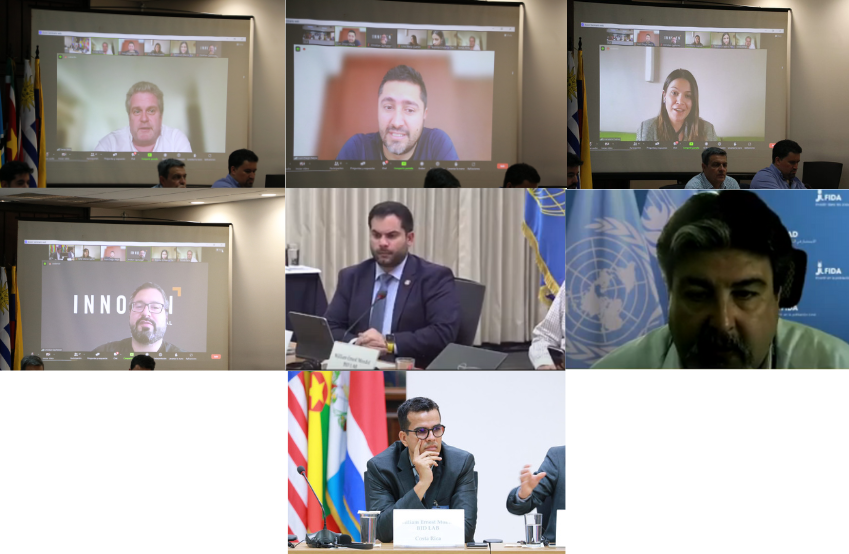CAF, IFAD and IDB Lab, as well as the funds Innogen Capital, Cube Ventures, Agcenter and The Yield Lab, reviewed the factors that can provide technology companies focused on the agriculture sector with greater access to funding opportunities.

San José, 2 de junio de 2023- IICA. Specialists and senior executives of funding agencies and investment and venture capital funds agreed that the promotion of sustainable processes, long-term profitability and the generation of innovative solutions that increase production efficiency are key elements that can provide technology companies applied to agrifood systems, or AgTechs, with greater access to investment and funding opportunities in Latin America and the Caribbean.
At the Digital Agriculture Week organized by the Inter-American Institute for Cooperation on Agriculture (IICA), held virtually and in person at its headquarters in Costa Rica, representatives of these financial organizations in the hemisphere also stated that investments in AgTechs must go hand in hand with market demands, as a requisite factor to receive funding.
The IICA event was supported by CAF-Development Bank of Latin America, the International Fund for Agricultural Development (IFAD), IDB Lab, Bayer, Microsoft, The Yield Lab and Veolia.
The executives of these funds and multilateral funding agencies agreed that investment in digital agriculture is crucial to improve the sector’s productivity and efficiency, as well as to address global challenges related to food security, climate change and scarce resources.
They also explained that, over the past three years, more than USD 25 billion in private investment, particularly from venture capital funds, has been allocated to technology development. They noted that AgTechs still account for a very small portion of those funds, but nevertheless have great potential for growth.
According to Tomás Peña, Director of The Yield Lab for Latin America, innovation used to be concentrated in just a few stakeholders and is now distributed among several public and private sector stakeholders. This poses a challenge and makes it necessary to engage in collaborative and ecosystemic work to bring financial resources to AgTechs that are truly committed to generating innovative solutions.
Lina María Cuervo, co-founder and co-director of Cube Ventures, noted that her business accelerator’s venture capital fund prioritizes gender equality to support new AgTechs, with a view to fostering innovation, well-being and obtaining higher quality and healthier products.
Juan Diego Mejía, Investment Director at Agcenter, stated that the resources of that acceleration and investment hub are geared towards agricultural producers and AgTechs in the Andean region that wish to generate an impact in the market by diversifying and innovating at a faster rate. As such, its primary focus is strengthening the sector and creating valuable connections.
“Once we identified the opportunity, studied it and generated the requisite knowledge, we decided to bet on AgTechs for the development of new technologies that integrate solutions and optimize resources. These are the first steps in investment in digital technologies geared towards the agriculture sector”, said Christian Quiñones, co-founder of the venture capital fund Innogen Capital.
On the other hand, representatives of financial agencies with state contributions such as IDB Lab, IFAD and CAF-Development Bank of Latin America, noted that these institutions seek to boost digital transformation in agriculture by fostering efficiency, sustainability and the development of smarter and more profitable agricultural practices.
“For the Inter-American Development Bank and its IDB Lab project, it is crucial that companies seeking access to funding for digital technology development have proven experience; their ideas should have a systemic impact and they must offer technological innovations”, explained William Ernest, Senior Specialist at IDB Lab.
Enrique Hennings, Lead Technical Specialist in Rural Markets and Enterprises at IFAD, shared the experience of the Innovatech project, whose goals are to reduce the rural digital divide, support profitable and social business models, and foster financial inclusion for AgTechs.
“Innovatech is geared towards companies that focus on the development of new technologies to meet the high market demand of the agriculture sector, and that otherwise may be unable to access funding”, said Hennings.
Eduardo Chomali, Principal Executive of Telecommunications and Information and Communication Technologies at CAF-Development Bank of Latin America, remarked that agricultural digitalization will improve the productivity and competitiveness of agriculture, a key sector for the region.
“At present, every link in the agrifood chain has access to digital solutions, such as blockchain, big data, the use of drones, artificial intelligence, Internet of Things and others. We want to support companies that work with these resources to maximize the potential of the digital ecosystem as an engine of development for Latin America and the Caribbean”, noted Chomali.
More information:
Institutional Communication Division.
comunicacion.institucional@iica.int











